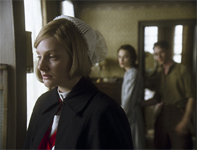Atonement
|  Atonement, which has been adapted from Ian McEwan's bestselling novel, starts with the intimate, spreads itself out to the epic, and then tries to return to an even deeper and more intimate interiority, one that is meant to make us cry with the tragedy while simultaneously questioning the very ability of art to redeem such tragedy. It tries to tug at your heart and your brain at the same time, and if the film had found that soft spot beneath our ribs where we're willing to give ourselves over to romantic flights of fancy and grandiose tragedy, it might have earned the profundity of its conclusion. Unfortunately, director Joe Wright, who made a wonderful adaptation of Jane Austen's Pride & Prejudice two years ago, isn't quite able to recapture the magic. Atonement is no doubt beautiful, but at some points Wright appears to be simply showing off the dexterity of his visual ambitions to the detriment of the story's emotional core. Atonement, which has been adapted from Ian McEwan's bestselling novel, starts with the intimate, spreads itself out to the epic, and then tries to return to an even deeper and more intimate interiority, one that is meant to make us cry with the tragedy while simultaneously questioning the very ability of art to redeem such tragedy. It tries to tug at your heart and your brain at the same time, and if the film had found that soft spot beneath our ribs where we're willing to give ourselves over to romantic flights of fancy and grandiose tragedy, it might have earned the profundity of its conclusion. Unfortunately, director Joe Wright, who made a wonderful adaptation of Jane Austen's Pride & Prejudice two years ago, isn't quite able to recapture the magic. Atonement is no doubt beautiful, but at some points Wright appears to be simply showing off the dexterity of his visual ambitions to the detriment of the story's emotional core.The story begins in the palatial estate of the Tallis family in rural England in the mid-1930s. We are first introduced to the gangly and precocious Briony (Saoirse Ronan), a 13-year-old would-be writer, and her sleek, slightly aloof older sister, Cecilia (Keira Knightley). In the first of three crucial misperceptions, Briony spies Cecilia apparently disrobing and leaping into a fountain at the vigorous behest of Robbie Turner (James McAvoy), the son of the family's housekeeper (Brenda Blethyn). In a sly narrative turn, Wright takes us back to the exact same event but from the perspective of Cecilia and Robbie, and we discover that it is, in fact, an innocent incident that precipitates the eventual eruption of their mutual attraction. Briony also comes into possession of a letter Robbie wrote to Cecilia, but never meant for her to read, and then stumbles across them in a passionate embrace in the library. All of this might simply reside in the young girl's fervid imagination to feed future stories, but that night the family's teenage cousin (Juno Temple) is raped, an event that Briony also happens to witness, and she pins the blame on Robbie. Thus, because of Briony's accusation, Robbie and Cecilia are forcibly torn apart and he is sent to prison and then to the front lines of World War II. Meanwhile, Cecilia separates herself from her family and goes to London to work as a nurse. Briony (now played as an 18-year-old by Romola Garai) follows, all to aware of the damage she has done to the lives of the would-be lovers and wracked with guilt at her childish misdeed. While the first half of Atonement is tightly concentrated in the Tallis family home, the second half is spread across the expanse of a world at war, with Robbie separated from his regiment in the French countryside and eventually making his way to the beaches of Dunkirk for evacuation while Cecilia and Briony work in separate hospitals in London where they witness the bloody results of what combat can do to the human body. One sequence in particular in which dozens of injured soldiers arrive at Briony's hospital plays as a horrific reminder of what fate she may have damned Robbie to; each broken body could be his. Wright and cinematographer Seamus McGarvey (The Hours) strive to make Atonement as visually rapturous as possible, and there are moments when they succeed in creating images of striking poetic resonance. A shot of Robbie standing alone against a movie screen in which a couple passionately embraces is a moving portrait of loss, and many of the scenes at the Tallis estate beautifully encapsulate the pampered isolation of wealth in a world on the brink of madness. At other times they overstep, clearly reaching too far in the use of gauzy photography and eye-grabbing camera movement. When Robbie hands the wrong letter to Briony for delivery to Cecilia, the letter literally glows in the late afternoon light like a magical talisman, and Wright's much-remarked-upon four-minute tracking shot through the chaos at Dunkirk is certainly an aesthetic tour de force, but one that doesn't work emotionally or narratively. It is, in Wright's own words, simply showing off. Atonement eventually winds its way to a denouement that contains the essence of the story, as an elderly Briony (played with wonderful conviction by Vanessa Redgrave) grants a television interview in which she discusses the autobiographical book she has just written. With a heavy heart she explains how she finally managed to atone for her sin against Robbie and Cecilia, an act that simultaneously suggests the power of art to transcend and its inherent limitations in the face of life's greatest tragedies. While there is great poignancy and emotion in these final moments, there is also the unfortunate, nagging sense that their primary purpose is to atone for the film's other shortcomings. Copyright ©2007 James Kendrick Thoughts? E-mail James Kendrick All images copyright ©2007 Focus Features |
Overall Rating: 

 (2.5)
(2.5)


